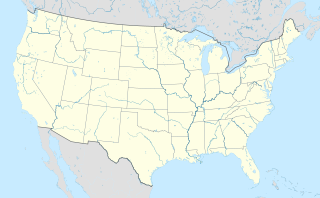
Pinal County is located in the central part of the U.S. state of Arizona. According to U.S. Census Bureau estimates in 2019, the population of the county was 462,789, making it Arizona's third-most populous county. The county seat is Florence. The county was founded in 1875.

Arizona City is a census-designated place (CDP) in southwestern Pinal County, Arizona, United States. It is located near the junction of Interstate 8 and Interstate 10 at the midpoint between Phoenix and Tucson, approximately 60 miles (97 km) from the downtown of both cities. The population was 10,475 as of the 2010 U.S. Census. It is estimated to be approximately 11,030 as of a 2017 U.S. Census estimate. Arizona City is a rural, primarily residential community that features a 48-acre man-made lake. These attributes make the community a popular snowbird destination, with the population increasing by as much as 5,000 people in the winter months to reach the census figure of 11,030.

Casa Grande is a city in Pinal County, approximately halfway between Phoenix and Tucson in the U.S. state of Arizona. According to U.S. Census estimates, the population of the city is 55,653 as of 2020. It is named after the Casa Grande Ruins National Monument, which is actually located in Coolidge. "Casa Grande" is Spanish for "big house". Among resident English speakers, there is no consensus on how to pronounce the city's name.

Coolidge is a city in Pinal County, Arizona, United States. According to the 2010 census, the city's population is 11,825.

Founded in 1925, The Brotherhood of Sleeping Car Porters (BSCP) was the first labor organization led by African Americans to receive a charter in the American Federation of Labor (AFL). The BSCP gathered a membership of 18,000 passenger railway workers across Canada, Mexico, and the United States. Beginning after the American Civil War, the job of Pullman porter had become an important means of work in the black community in the United States. As a result of a decline in railway transportation in the 1960s, BSCP membership declined. It merged in 1978 with the Brotherhood of Railway and Airline Clerks (BRAC), now known as the Transportation Communications International Union.

Casa Grande Ruins National Monument, in Coolidge, Arizona, just northeast of the city of Casa Grande, preserves a group of Hohokam structures dating to the Classic Period.

Ruby is a ghost town in Santa Cruz County, Arizona, United States. It was founded as a mining town in Bear Valley, originally named Montana Camp, so named because the miners were mining at the foot of Montana Peak.

Embudo is an unincorporated community in Rio Arriba County, New Mexico, United States. It is on NM State Road 68. The Embudo Station is located 2.9 miles south of the intersection of NM State Road 75, near where the Embudo River flows into the Rio Grande.

This is a list of the National Register of Historic Places listings in Pinal County, Arizona.

Polvadera is an unincorporated community and census-designated place in Socorro County in central New Mexico, United States. It is located on the west bank of the Rio Grande, near the mouth of the Rio Salado, and on the western spur of El Camino Real de Tierra Adentro.

Theba is a census-designated place in Maricopa County, Arizona, United States. Its elevation is 728 feet (222 m). Theba is located along Interstate 8 and is served by Exit 106.

Hilgard is an unincorporated community in Union County, Oregon, United States, at the junction of Oregon Route 244 with Interstate 84/U.S. Route 30, near the Grande Ronde River. It is also the site of a junction (wye) of the Union Pacific Railroad. Hilgard Junction State Recreation Area is across the river from the community.

Christmas is an uninhabited mining community in Gila County, Arizona, United States. The mine which led to creation of the town was staked on Christmas Day 1902, prompting the name. During the three decades in which the town's post office operated it was a popular destination for holiday mail seeking a "Christmas" postmark. The mine is also the location where the minerals apachite, junitoite, and ruizite were first discovered.

Kelvin is an unincorporated community in Pinal County, Arizona, United States. Kelvin is located near the Gila River, 24.6 miles (39.6 km) east-northeast of Florence.

Adamsville was a populated place in Pinal County, Arizona. Once a thriving farm town, it became a ghost town by the 1920s. Adamsville is located at an elevation is 1,450 feet, on the south bank of the Gila River, west of Florence, Arizona.

The following is a timeline of the history of the area which today comprises the U.S. state of Arizona. Situated in the desert southwest, for millennia the area was home to a series of Pre-Columbian peoples. By 1 AD, the dominant groups in the area were the Hohokam, the Mogollon, and the Ancestral Puebloans. The Hohokam dominated the center of the area which is now Arizona, the Mogollon the southeast, and the Puebloans the north and northeast. As these cultures disappeared between 1000 and 1400 AD, other Indian groups settled in Arizona. These tribes included the Navajo, Apache, Southern Paiute, Hopi, Yavapai, Akimel O'odham, and the Tohono O'odham.

Casa Grande is a heritage-listed villa at Nettle Street, Mount Isa, City of Mount Isa, Queensland, Australia. It was designed by Donoghue, Cusick & Edwards and built in 1949. It was added to the Queensland Heritage Register on 28 May 1999.

Ida Redbird (1892-1971) was a Maricopa potter from the Gila River Indian Community of the Gila River Indian Reservation in Arizona. She was the first president of the Maricopa Pottery Maker's Association and was widely credited with the revival of ancient Maricopa pottery techniques and forms. Her polished black-on-redware pottery was highly prized with collectors. Texas photographer Ted Sayles shot a series documenting Redbird sculpting her pottery. The series toured museums throughout the Western United States



















